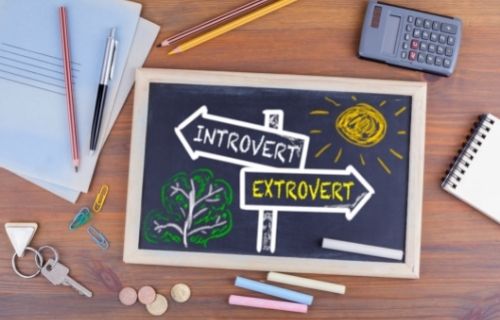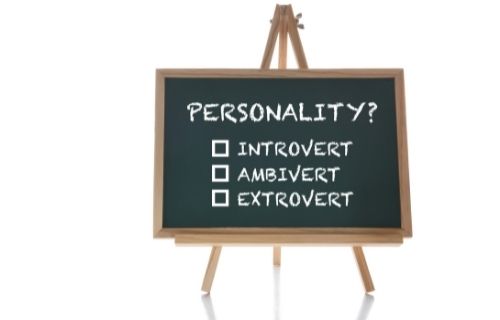Difference Between Omnivert and Ambivert
Who are you, really? We know it’s a nosy question, and perhaps even an uncomfortable one. Each of us has a sense of the basic traits that define us. Our lives are driven by these traits that most of us do not fully understand. These traits revolve around the fact that whether you’re an introvert or an extrovert. This introvert/ extrovert divide is the most fundamental aspect of personality. Have you ever wondered are you an introvert or an extrovert, or both or something in between? This is where these two terms – omnivert and ambivert – come to the picture.

What is Omnivert?
Extroverts are individuals who proudly wear the label of being outgoing and directing attention to things other than themselves. They are not afraid to let people know they are fearless when it comes to speaking in public, meeting in public, going to big gatherings or events, and so on. Introverts are kind of reserved and thoughtful individuals who do not seek out attention, do not go out to big gatherings, do not speak out loud, or in short, they don’t like to socialize. But some individuals can be both reserved and outgoing. They can assume the personality traits of both an introvert and an extrovert. You can call these folks omniverts.
Omniverts can be both quiet, reserved and fearless, outgoing. They can be very reserved and isolated when presented with situations they don’t want to be in or care about. And they can also be the life of the party when they are enjoying. This means that their personality type is entirely situational. They can be introvert at some times and extrovert at others. They need people and they also need alone time to take a momentary break from their extroverted self. In short, omniverts can be both introverts and extroverts.

What is Ambivert?
Contrary to a popular belief, ambiverts are not social introverts. Instead, they are individuals who can balance the traits of introverts and extroverts simultaneously. For example, they are fine with small talks but they also demonstrate excellent listening skills. Top level executives normally exhibit traits of an ambivert because they are more flexible, versatile and neutral. Ambiverts are those who score midpoint on the introvert-extrovert scale. They can be an introvert or an extrovert depending on the context or how they feel at the moment.
Ambivert is a personality type that exists somewhere between being an extrovert and an introvert. Ambiverts like meeting people, but do so with people they already know in situations like meeting a new coworker in office, meeting a new student in class, or meeting a mutual friend. They are also happy to speak up when addressed during conversations but they also don’t mind listening to others as well. They tend to be passive in conversations, but they can join in when their favorite subjects comes up.
Difference between Omnivert and Ambivert
Personality Type
– Omniverts can be both introvert at some times and extrovert at others. They can assume the personality traits of both an introvert and an extrovert depending on the type of situation. Their personality type is entirely situational. Ambiverts, on the other hand, are individuals who can balance the traits of introverts and extroverts simultaneously. They exist somewhere between being an extrovert and an introvert.
Adaptability
– Ambiverts are a mix of introversion and extroversion, meaning they score midpoint on the introvert-extrovert scale. They lean into each moment and adapt to what the situation requires. Omniverts can be very reserved and isolated when presented with situations they don’t want to be in. They can be like two different people, depending on the situation they are in. They do not typically adapt to situations more easily.
Balance
– Ambiverts have the tendency to balance between the two personality traits, meaning they can be extroverts if the situation calls for it and they can also be quiet and reserved. They maintain this balance at any given moment. Omniverts cannot maintain a balance all the time; they can be completely extroverted when they are in extrovert mode, and they are in introvert mode, they are unmistakably introverted.
Emotional Stability
– Ambiverts are typically more emotionally stable and they have more resilience and find it easy to keep calm under different circumstances. Ambiverts tend to have a balanced approach and they try to give equal weightage to opposing ideas. Omniverts, on the other hand, seem less emotionally stable and their social skills vary greatly. Omniverts approach to social demands is more reactive whereas ambiverts are more adaptive and stable.
Omnivert vs. Ambivert: Comparison Chart

Summary
Omniverts can be both quiet, reserved and fearless, outgoing. This means that their personality type is entirely situational. They can be introvert at some times and extrovert at others. They do not show any consistency in their communication and behavior, and they tend to be less emotionally stable. Ambiverts are more emotionally stable and resilient, and they maintain consistency in the way they talk, act and behave. Ambiverts maintain a perfect balance between being an extrovert and an introvert.
Is Omnivert same as Ambivert?
Omniverts can be both introverts and extroverts, depending on the situation they’re in. But they show no consistency in their behavior and conversation. Ambiverts are more balanced, emotionally stable, and adaptable. So, both the personality traits are not exactly the same.
Who is better Ambivert or Omnivert?
Ambiverts tend to maintain a balance between the two personality traits at any given time, so they certainly have a distinctive advantage over their omnivert counterparts.
How do I know if I’m an Omnivert?
If you demonstrate the classic traits of both introverts and extroverts, for example, if you like to party and enjoy socializing with people, and you can also be reserved when presented with situations you don’t want to be, then you’re an omnivert.
Are Ambiverts rare?
No, ambiverts are not rare. In fact, the upper-level executives, such as a CEO, a Director, or a Manager are mostly ambiverts because they are more flexible, versatile and neutral in their behavior and conversations.
- Difference Between Caucus and Primary - June 18, 2024
- Difference Between PPO and POS - May 30, 2024
- Difference Between RFID and NFC - May 28, 2024
Search DifferenceBetween.net :
Leave a Response
References :
[0]Little, Brian. Who Are You, Really?: The Surprising Puzzle of Personality. New York, United States: Simon and Schuster, 2017. Print
[1]Cain, Susan. Quiet: The Power of Introverts in a World That Can't Stop Talking. London, England: Penguin UK, 2012. Print
[2]Reeves, Nancy. Spirituality for Extroverts: And Tips for Those Who Love Them. Tennessee, United States: Abingdon Press, 2010. Print
